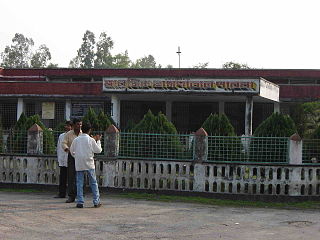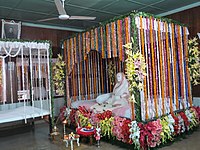
Bargarh is one of the major towns of Western Odisha and a municipality in Bargarh district in the state of Odisha in India. It is the administrative headquarters of Bargarh District and is one of the most important towns of Odisha because it is known as the "rice bowl of Odisha" due to its intense rice production, it is a agroindustrial hub and is also known as "city of handloom" because sambalpuri sari originated from here."Dhanujatra" of Bargarh is world famous and is known as the "world's largest open theatre". Bargarh was awarded with the "fastest moving city" award under the 50k-100k category in Swachh Sarbekhyan 2022 in the east zone.
Wardha is a city and a municipal council in Wardha district in the Indian state of Maharashtra. The administrative headquarter of Wardha district is situated here. Wardha gets its name from the Wardha River which flows on the northern, western and southern boundaries of the district. Founded in 1866, the town is now an important centre for cotton trade. Wardha was an important part of the Gandhian era.

Deoghar is a major city in Jharkhand, eastern India. It is a holy place of Hinduism. The city is primarily known for Baidyanath Temple, one of the 12 Jyotirlingas of Shiva, one of the principal deities in Hinduism. The sacred temples of the city make this a place for pilgrimage and tourists. The city is very sacred to the followers of Hinduism.

Dumka, the headquarters of the Dumka district and Santhal Pargana region, is a city in the state of Jharkhand, India. It was made the headquarters of the Santhal Pargana region, which was carved out of the Bhagalpur and Birbhum district after the Santal Hool of 1855. Dumka was carved out of the southern part of Bihar along with 18 other Districts on 15 November 2000 to form Jharkhand as 28th State of India. Dumka is a peaceful and green city and also sub-capital of Jharkhand. The nearest important cities are Rampurhat and Deoghar.

Hemayetpur or Himaitpur is a small village of Pabna Sadar Upazila in Pabna District of Bangladesh. It is situated on the bank of Padma river.

Radha Soami is a spiritual tradition or faith founded by Shiv Dayal Singh in 1861 on Basant Panchami Day in Agra, India.

Deoghar district is one of the twenty-four districts of Jharkhand state in eastern India. Deoghar, the central city of the district, is also its administrative headquarters. This district is known for the Baidyanath Jyotirlinga shrine and is a part of the Santhal Pargana division. Deoghar is a Hindi word meaning abode ('ghar') of the Gods and Goddesses ('dev'). Deoghar is also known as "Baidyanath Dham", and "Baba Dham",.

Baidyanath Temple, also known as Baba Baidyanath Dham, is a Hindu temple dedicated to Shiva. It is located in Deoghar, in the Santhal Parganas division of the Indian state of Jharkhand. The temple complex comprises the central shrine of Baba Baidyanath along with 21 additional temples. It is significant to the Hindu sects of Shaivism as this temple is referred to as one of the twelve Jyotirlingas.

Yatra, in Indian-origin religions, Hinduism, Buddhism, Jainism and Sikhism, generally means a pilgrimage to holy places such as confluences of sacred rivers, sacred mountains, places associated with Hindu epics such as the Mahabharata and Ramayana, and other sacred pilgrimage sites. Visiting a sacred place is believed by the pilgrim to purify the self and bring one closer to the divine. The journey itself is as important as the destination, and the hardships of travel serve as an act of devotion in themselves.

Salig Ram, successor of Shiv Dayal Singh second Sant Satguru of the Radhasoami Satsang popularly known by the honorific "Huzur Maharaj" and by the government-conferred title "Rai Bahadur," was born in Peepal Mandi, Agra, on 14 March 1829. He served as chief inspector of post offices in British India, and, in 1881, was Postmaster-General of the North-Western Provinces, based in Allahabad. He was the first Indian to hold the position.
Tulsi Peeth Seva Nyas is an Indian religious and social service institution based at Janki Kund, Chitrakoot, Madhya Pradesh, India. It was established by the Hindu religious leader Jagadguru Rambhadracharya on August 2, 1987. Rambhadracharya believes that this Peeth is situated at the place where the Hindu god Rama gave his sandals to his brother Bharat.
Satsang Deoghar disaster is a human stampede that occurred on 24 September 2012, in which twelve people died and thirty people were injured at the Satsang Ashram in Deoghar, Jharkhand.

Yuga Purusottom Sri Sri Thakur Anukulchandra, popularly known as Sree Sree Thakur, was an Indian homeopathic physician and spiritual guru and the founder of Satsang, in Deoghar, Jharkhand. He was born in a Brahmin family.

Satsang is a philanthropic organization founded by Sree Sree Thakur Anukulchandra. It is one of the major spiritual and cultural movements in India started in the early 20th century. Satsang was originally registered in Pabna in 1925 as a public charitable institution. However, after the Independence and partition of India, it was again registered in 1951 in the Indian Union under the Societies Registration act of 1860.
Satsang is an audience with a Satguru for religious instruction.
Gamiripal, also known as Hukai Gaon or Kumar gaon, is a village in Jamugurihat of Sonitpur district, in the Indian state of Assam.




















